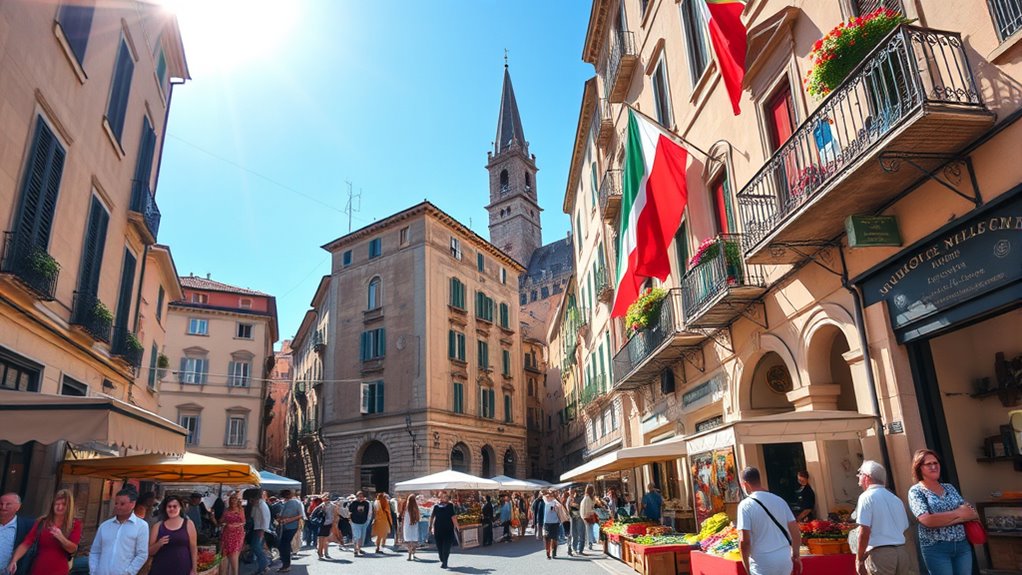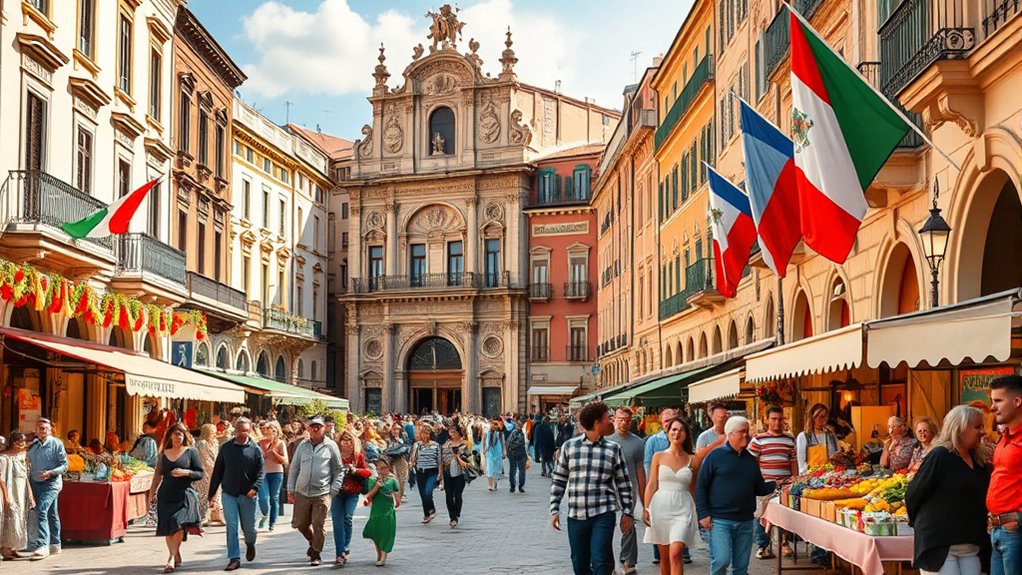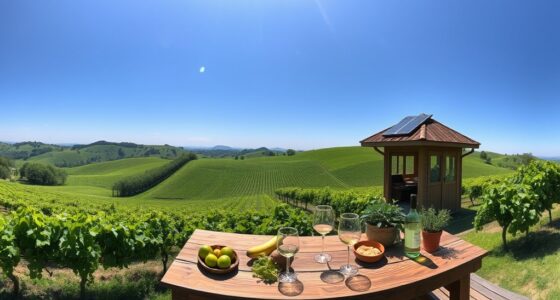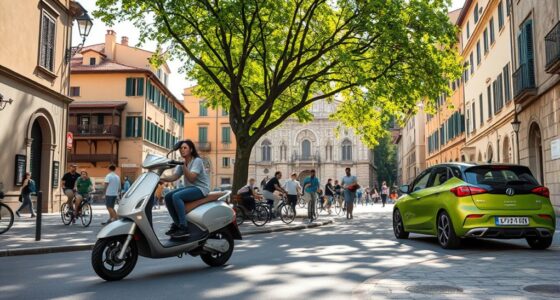Understanding Italian public holidays helps you plan your trip effectively by avoiding closures and missing out on local festivities. Many holidays highlight regional customs, religious traditions, or historical events, featuring parades, fireworks, and special foods. Some places shut down, especially during major celebrations like Ferragosto or regional festivals. Being aware of these dates allows you to join in authentic cultural experiences or visit attractions when they’re open. Keep exploring to discover more about Italy’s vibrant holiday traditions.
Key Takeaways
- Familiarize yourself with regional festivals like Venice’s Festa della Sensa and Sicily’s Feast of Saint Agatha to experience local culture.
- Be aware of national holidays such as Liberation Day and Ferragosto, which may affect business hours and travel plans.
- Plan ahead around public holidays to participate in traditional events, processions, and fireworks that showcase Italy’s cultural heritage.
- Note that many businesses close during holidays, especially in August, requiring advance arrangements for accommodations and services.
- Understanding the significance of these holidays enhances cultural appreciation and helps optimize your trip itinerary.

Italy’s public holidays offer a fascinating glimpse into the country’s rich history, culture, and traditions. As you plan your trip, understanding these holidays helps you grasp the local customs and anticipate special events or closures. One of the most captivating aspects of Italian public holidays is their regional celebrations, which showcase the unique history and identity of each area. For example, in Venice, the Festa della Sensa commemorates the historic marriage between the city and the sea, emphasizing Venice’s maritime history. In Sicily, the Feast of Saint Agatha reflects deep-rooted religious and cultural traditions specific to the region. These celebrations often feature processions, fireworks, and local food, giving you an immersive experience into regional customs that have been passed down through generations.
Many Italian holidays are rooted in the country’s historical significance, representing pivotal moments in Italy’s national development or local history. For instance, Liberation Day on April 25th marks Italy’s liberation from fascism and Nazi occupation during World War II. Participating in or witnessing parades and memorial events on this day provides insight into Italy’s resilience and collective memory. Similarly, the Festa di Roma, celebrated on June 21st, honors the founding of Rome, blending myth and history through reenactments, historical displays, and cultural events. Recognizing these holidays’ historical significance helps you appreciate Italy’s complex past and the pride Italians feel in their heritage. Additionally, public holiday customs often include traditional foods, music, and dances that are integral to local celebrations, enriching your cultural experience.
Some holidays, like Ferragosto on August 15th, blend religious and historical elements, marking the Assumption of the Virgin Mary but also serving as a summer holiday that encourages family gatherings and outdoor festivities. During this time, many businesses close, and locals head to the coast, so planning ahead ensures you don’t miss out on local experiences. Similarly, the Feast of Saint Nicholas in December reflects both religious devotion and regional traditions, especially in northern Italy, where it’s celebrated with markets and processions.
Frequently Asked Questions
Do Public Holidays Vary Between Italian Regions?
Public holidays do vary between Italian regions due to regional differences and local celebrations. You’ll find that certain festivals or public days are specific to particular areas, reflecting local traditions and patron saints. These regional variations mean you might experience different days off or unique celebrations depending on where you are in Italy. Keep this in mind when planning your trip, as some attractions or services could be affected by these local holidays.
Are Shops and Restaurants Open During Italian Public Holidays?
Think of public holidays as a double-edged sword. On these days, shops often cut back their shopping hours, and many restaurants close their doors, especially during major celebrations. While some tourist spots might stay open, expect limited hours and fewer dining options. To avoid surprises, plan ahead and check local schedules, so your trip doesn’t hit a snag when shops and restaurants aren’t running at full tilt.
How Do Public Holidays Affect Transportation Schedules?
Public holidays considerably impact public transport and holiday schedules in Italy. You’ll notice reduced services or altered schedules on these days, so it’s wise to check local transit websites beforehand. Buses, trains, and metro systems often run less frequently or operate on special holiday timetables. Planning ahead helps you avoid delays, ensuring you get where you need to go without surprises during public holidays.
Are There Any Unique Local Festivals on Public Holidays?
Did you know Italy hosts over 50 unique local festivals during public holidays? On these days, you can experience vibrant cultural celebrations and traditional events that showcase Italy’s rich heritage. These local festivals often feature lively parades, food, and music, offering an authentic glimpse into regional customs. Participating in these festivals provides a memorable way to connect with local traditions and enjoy Italy’s diverse cultural tapestry firsthand.
What Are the Best Times to Visit Italy Avoiding Holidays?
If you want to enjoy Italy without the crowds, plan your trip during off-peak months like late fall, winter, or early spring. These are ideal for seasonal travel because you’ll avoid busy public holidays and local festivals. Traveling during these times means fewer tourists, better hotel deals, and a more authentic experience. Keep in mind that some attractions may have limited hours, so check ahead before you go.
Conclusion
Understanding Italian public holidays helps you plan your trip smoothly. For example, if you visit Rome during Ferragosto in August, many attractions might close or be crowded. By knowing these dates, you can avoid surprises and make the most of your trip. So, before booking, check the holiday calendar. This way, you’ll experience Italy’s culture fully, whether it’s a lively festival or a quiet, authentic day in town.









